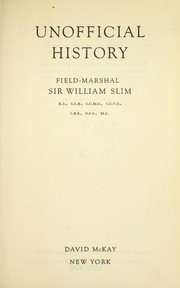Unofficial History

About
Summary
Exquisite
TOC
Details
Related
URL
Images
Overview
Unofficial History by Field Marshal Sir William Joseph Slim, published in 1959, offers a collection of reminiscences about his military career between and during the two World Wars. Slim recounts smaller battles and campaigns with a focus on the ordinary men involved, both in and out of combat. The book showcases Slim's writing style, wit, and humanity, providing a glimpse into his experiences with various adversaries, from the Wazirs of India's Northwest Frontier to the Turks and Italians.
Unofficial History presents a series of anecdotes and reflections from Slim's time as a soldier, focusing on campaigns and skirmishes outside the major theaters of war. These accounts offer a departure from traditional war histories, as Slim delves into the lives and experiences of ordinary soldiers and their interactions with diverse cultures and adversaries. He shares stories from his early military service, offering insights into the challenges and realities of colonial warfare. Slim's narrative also includes his encounters with the Wazirs, Turks, and Italians, portraying these adversaries with respect and even admiration. Through these reminiscences, Slim provides a unique perspective on the human side of war, highlighting the camaraderie, humor, and resilience of soldiers in the face of adversity.
Importance of Book
Unique Perspective on Military History: Unofficial History provides a departure from traditional war histories, offering a more personal and human perspective on military service.
Insights into Slim's Leadership Philosophy: The book offers glimpses into Slim's leadership philosophy, emphasizing the importance of understanding and respecting one's soldiers and adversaries.
Appreciation for the Common Soldier: Slim's focus on the experiences of ordinary soldiers elevates their stories and contributions, recognizing their vital role in military campaigns.
Historical Context for Understanding Colonialism: The book provides historical context for understanding the complexities of colonialism and its impact on both colonizers and the colonized.
Wit and Humanity: The book offers style, wit and exceptional humanity.
Key Themes
The Human Side of War: Slim emphasizes the experiences of ordinary soldiers and their interactions with diverse cultures and adversaries.Admiration for the Enemy: Slim expresses respect and admiration for his adversaries, recognizing their courage, skill, and humanity.The Importance of Leadership: The book implicitly highlights the importance of effective leadership in maintaining morale and achieving victory, even in challenging circumstances.The Realities of Colonial Warfare: Slim offers insights into the challenges and complexities of colonial warfare, exposing the cultural misunderstandings and the human cost of conflict.The Power of Humor and Resilience: Slim showcases the ability of soldiers to find humor and maintain resilience in the face of adversity, demonstrating the importance of these qualities for survival and success.
Cultural Significance
Reflection of British Military Tradition: The book reflects the traditions and values of the British military, including a sense of duty, courage, and respect for the enemy.
Exploration of Cultural Encounters: Unofficial History explores the cultural encounters between British soldiers and diverse populations, highlighting the challenges and opportunities for understanding and cooperation.
Promotion of Empathy and Understanding: By portraying adversaries with respect and humanity, Slim promotes empathy and understanding across cultural and political divides.
Contribution to War Literature: The book contributes to the body of war literature by offering a unique perspective on the human experience of conflict.
Slim's Legacy: Slim is remembered as the finest general World War II produced.
Effects on Society
Shaping Perceptions of Military Service: The book may influence readers' perceptions of military service by highlighting the challenges, sacrifices, and rewards of a career in the armed forces.
Promoting Dialogue about War and Peace: By offering a nuanced perspective on war, the book may encourage dialogue about the causes and consequences of conflict and the importance of seeking peaceful solutions.
Fostering Empathy and Understanding: Slim's portrayal of adversaries with respect and humanity may foster empathy and understanding across cultural and political divides, promoting tolerance and cooperation.
Inspiring Future Leaders: The book may inspire future leaders by offering insights into Slim's leadership philosophy and his ability to motivate and connect with his soldiers.
Better understanding of British military history: The book contributes to a better understanding of British military history and the role of the armed forces in shaping national identity and global events.
Conclusion
Unofficial History offers a valuable and insightful perspective on military service, leadership, and the human experience of war. Through his reminiscences of smaller battles and campaigns, Sir William Slim provides a unique glimpse into the lives of ordinary soldiers and their encounters with diverse cultures and adversaries. The book's cultural significance lies in its reflection of British military tradition, its exploration of cultural encounters, and its promotion of empathy and understanding. While it is difficult to measure its direct impact on the country and society, Unofficial History contributes to broader cultural conversations about war, leadership, and the importance of seeking peaceful solutions to conflict.
Title
Unofficial History
Author
Sir William Slim
Name of Publisher
Cassel London
Publish Date
1959
Subject
Unofficial History offers a detailed and personal account of Sir William Slim?s experiences during World War II, particularly his leadership in the Burma Campaign.
Vintage
1948-2000
Category
Literary
Sub Category
Social Sciences
Rarity
RARE
